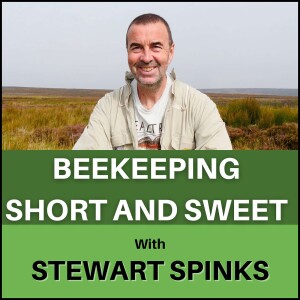
Hi I’m Stewart Spinks and welcome to episode 49 of my podcast, Beekeeping Short and Sweet. This week I’m looking forward to the start of the new season with some thoughts of what to look out for in that first inspection of the season.
Although it’s quite cold outside and the frosts have begun in earnest, the sun is shining brightly today unlike yesterday when we had quite dense fog for most of the day, and it’s beginning to look a lot like Spring will be here soon.
The Hazel catkins are in full flower right now and a gentle tap showers the air with a cloud of pollen. I’ve collected some to look at under the microscope and to show how easy microscopy is, especially if you keep an eye out for my online beginners course coming soon.
Anyway, with it looking really lovely and sunny outside my mind drifted towards the start of the new season, it’s still some way off as this is still late January but just like those Summer holidays you book in Winter, they come around very quickly and are gone in a flash. So I Thought I would take a look ahead to what I’ll be doing in a few weeks time when we start to see the daytime temperatures increase and the bees start to get out in earnest.
Keeping a watchful eye on your colonies through the Winter is essential, although this doesn’t have to happen on a weekly basis it’s good to check up on them regularly to make sure there are flying bees and they have enough food stores. As the warmer weather approaches the temptation to carry out a thorough inspection grips many beginner beekeepers and too many put their bees in a dangerous position by inspecting far too early in the season.
The reason the colonies are put in danger isn’t because the beekeeper is clumsy or that there is some hidden risk it’s simply that the bee hive gets opened when the outside air temperature is far too cold to be carrying out any meaningful inspection.
As we head into Spring, the colonies should be building up nicely, with an increased brood area as the queen increases her egg laying day by day. Unfortunately this coincides with the Winter bees, those that have kept the colony alive throughout the dark , cold days of December, January and February, dying out and reducing the overall number of bees in the hive. Those bees left have to work harder to keep the larvae fed and protected, this mainly means protected from the cold outside temperatures. Remember the brood area is going to be kept at something like 34-35 degrees C and if you’re splitting open the brood nest in temperatures of single figures the bees are going to have a really difficult time in bringing the brood area back up to the correct temperature. the result of this is that it leads to something called Chilled Brood. What tends to happen is the bees will only be able to get the temperature of the brood area up from the middle out and so larvae on the outer perimeter of the brood nest are left in temperatures that are far too low for them to survive.
When you finally get back in to the colony to inspect you may find a ring of brood on the outside of the brood nest area that has died, that’s chilled brood and generally the fault of the beekeeper.
Better to sit on your hands and not inspect the bees until the daytime temperature is at least 15 degrees C, some beekeepers call it T shirt weather but I saw a chap out a few days ago in a T shirt and it must have been around 8 degrees C, so better to go by the thermometer rather than the goosebumps.
You’ll already know if you have a live colony in the hive as you’ll have been watching them over the previous few weeks so that first inspection is to check how they have coped through the Winter.
Pick a day when it’s not blowing a gale too, nothing chills a brood nest quicker than a keen beekeeper in a Spring brisk breeze. So wait for a calm, warm day and aim for the warmest part of the day, around lunchtime if possible.
The plan here is to be
More Episodes
 2021-06-25
2021-06-25
 2021-06-11
2021-06-11
 2021-06-04
2021-06-04
 2021-05-28
2021-05-28
 2021-05-21
2021-05-21
 2021-05-14
2021-05-14
 2021-05-07
2021-05-07
 2021-04-30
2021-04-30
 2021-04-23
2021-04-23
 2021-04-16
2021-04-16
 2021-04-09
2021-04-09
 2021-04-02
2021-04-02
 2021-03-19
2021-03-19
 2021-03-12
2021-03-12
 2021-03-05
2021-03-05
 2021-02-26
2021-02-26
 2021-02-19
2021-02-19
Create your
podcast in
minutes
- Full-featured podcast site
- Unlimited storage and bandwidth
- Comprehensive podcast stats
- Distribute to Apple Podcasts, Spotify, and more
- Make money with your podcast
It is Free
- Privacy Policy
- Cookie Policy
- Terms of Use
- Consent Preferences
- Copyright © 2015-2024 Podbean.com





